高一语文《论语》引文翻译
《论语》选段翻译(中英文对照)
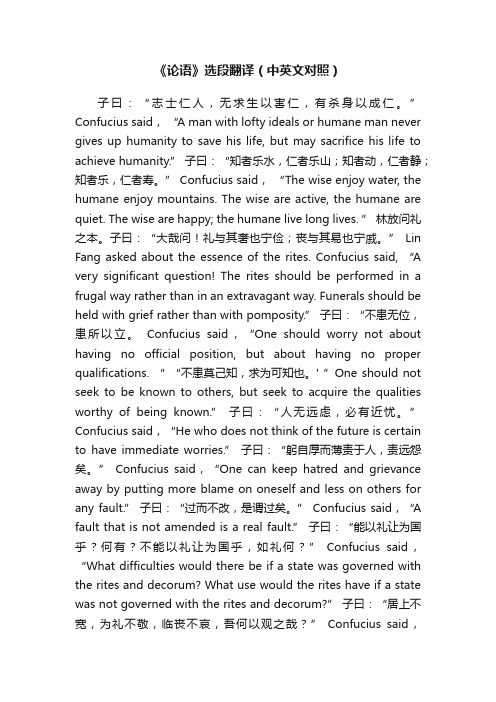
《论语》选段翻译(中英文对照)子曰:“志士仁人,无求生以害仁,有杀身以成仁。
” Confucius said,“A man with lofty ideals or humane man never gives up humanity to save his life, but may sacrifice his life to achieve humanity.” 子曰:“知者乐水,仁者乐山;知者动,仁者静;知者乐,仁者寿。
” Confucius said,“The wise enjoy water, the humane enjoy mountains. The wise are active, the humane are quiet. The wise are happy; the humane live long lives. ” 林放问礼之本。
子曰:“大哉问!礼与其奢也宁俭;丧与其易也宁戚。
” Lin Fang asked about the essence of the rites. Confucius said, “A very significant question! The rites should be performed in a frugal way rather than in an extravagant way. Funerals should be held with grief rather than with pomposity.” 子曰:“不患无位,患所以立。
Confucius said,“One should worry not about having no official position, but about having no proper qualifications. “ “不患莫己知,求为可知也。
' ”One should not seek to be known to others, but seek to acquire the qualities worthy of being known.” 子曰:“人无远虑,必有近忧。
《论语》中英文对照版

论语 CONFUCIAN ANALECTS学而第一『⒈1』子曰:“学而时习之,不亦说乎?有朋自远方来,不亦乐乎?人不知而不愠,不亦君子乎?”The Master said: "Is it not pleasant to learn with a constant perseverance and application? "Is it not delightful to have friends coming from distant quarters? "Is he not a man of complete virtue, who feels no discomposure though men may take no note of him?"『⒈2』有子曰:“其为人也孝弟,而好犯上者,鲜矣;不好犯上,而好作乱者,未之有也。
君子务本,本立而道生。
孝弟也者,其为仁之本与!”The philosopher Yu said, "They are few who, being filial and fraternal, are fond of offending against their superiors. There have been none, who, not liking to offend against their superiors, have been fond of stirring up confusion. "The superior man bends his attention to what is radical. That being established, all practical courses naturally grow up. Filial piety and fraternal submission,-are they not the root of all benevolent actions?"『⒈3』子曰:“巧言令色,鲜矣仁!”The Master said, "Fine words and an insinuating appearance are seldom associated with true virtue."『⒈4』曾子曰:“吾日三省吾身——为人谋而不忠乎?于朋友交而不信乎?传不习乎?”The philosopher Tsang said, "I daily examine myself on three points:-whether, in transacting business for others, I may have been not faithful;-whether, in intercourse with friends, I may have been not sincere;-whether I may have not mastered and practiced the instructions of my teacher."『⒈5』子曰:“道千乘之国,敬事而信,节用而爱人,使民以时。
完整版论语选段翻译中英文对照
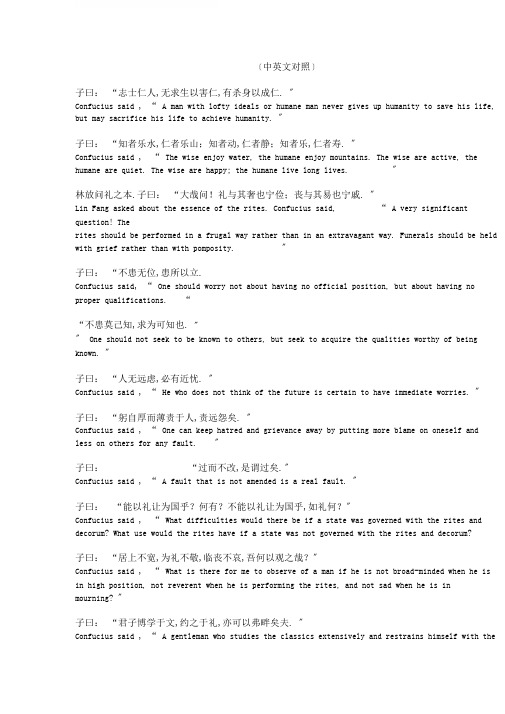
〔中英文对照〕子曰:“志士仁人,无求生以害仁,有杀身以成仁. 〞Confucius said , “ A man with lofty ideals or humane man never gives up humanity to save his life, but may sacrifice his life to achieve humanity. 〞子曰:“知者乐水,仁者乐山;知者动,仁者静;知者乐,仁者寿. 〞Confucius said , “ The wise enjoy water, the humane enjoy mountains. The wise are active, the humane are quiet. The wise are happy; the humane live long lives. 〞林放问礼之本.子曰:“大哉问!礼与其奢也宁俭;丧与其易也宁戚. 〞Lin Fang asked about the essence of the rites. Confucius said, “ A very significant question! Therites should be performed in a frugal way rather than in an extravagant way. Funerals should be held with grief rather than with pomposity. 〞子曰:“不患无位,患所以立.Confucius said, “ One should worry not about having no official position, but about having no proper qualifications. ““不患莫己知,求为可知也. "〞One should not seek to be known to others, but seek to acquire the qualities worthy of being known. 〞子曰:“人无远虑,必有近忧. 〞Confucius said , “ He who does not think of the future is certain to have immediate worries. 〞子曰:“躬自厚而薄责于人,责远怨矣. 〞Confucius said , “ One can keep hatred and grievance away by putting more blame on oneself and less on others for any fault. 〞子曰:“过而不改,是谓过矣. 〞Confucius said , “ A fault that is not amended is a real fault. 〞子曰:“能以礼让为国乎?何有?不能以礼让为国乎,如礼何?〞Confucius said , “ What difficulties would there be if a state was governed with the rites and decorum? What use would the rites have if a state was not governed with the rites and decorum?子曰:“居上不宽,为礼不敬,临丧不哀,吾何以观之哉?〞Confucius said , “ What is there for me to observe of a man if he is not broad-minded when he is in high position, not reverent when he is performing the rites, and not sad when he is in mourning? 〞子曰:“君子博学于文,约之于礼,亦可以弗畔矣夫. 〞Confucius said , “ A gentleman who studies the classics extensively and restrains himself with therites will not depart from the Way.子曰:“弟子入那么孝,出那么弟〞Confucius said , “ Young people should be filial to their parents at home and respectful to their brothers when they are with them. 〞〞谨而信,泛爱众,而亲仁. “〞They should be serious and trustworthy, love the populace extensively and be close to those who are humane. “行有余力,那么以学文. 〞“ When all this is done and there is time for other things, they should use it for the study ofthe classics. 〞子曰:“父母在,不远游,游必有方. 〞Confucius said , “ While one ’ s parents are alive, one should not travel to distant places. If it isnecessary to travel, there should be a definite direction. 〞子曰:“岁寒,然后知松柏之后凋也. 〞Confucius said , “ Only in cold winter does one know that the pine and the cypress are the last to shed their leaves. 〞子曰:“君子喻于义,小人喻于利. 〞Confucius said , “ The gentleman knows what is right; the mean person keeps his mind only on gains."子曰:“君子周而不比,小人比而不周. 〞Confucius said “, The gentleman unites and does not plot with others; the mean man plots and does not unite wi th others. 〞子曰:“君子和而不同,小人同而不和. 〞Confucius said , “ The gentleman aims at harmony, and not at uniformity. The mean man aims at uniformity, and not at harmony. 〞子曰:“德之不修,学之不讲.闻义不能徒,不善不能改,是吾忧也. 〞Confucius said , “ Neglect of moral cultivation, neglect of learning and practicing what has been learned, failure to follow what is right, and failure to correct what is wrong —these are my ___ ・ _ _ 〞worries. 〞子曰:“益有三乐,损有三乐. "Confucius said , “ Three kinds of pleasure are beneficial, and three kinds pleasure are harmful. “乐节礼乐,乐道人之善,乐多贤友,益矣.The pleasure of being regulated by the rites and music, the pleasure of praising other men’ s goodness, and the pleasure of having many virtuous friends are beneficial." 乐骄乐,乐佚游,乐宴乐,损矣. 〞"The pleasure of being conceited, the pleasure of unrestrained wanderings, and the pleasure of indulging in eating and drinking are harmful. 〞子曰:“见贤思齐焉,见不贤而内自省也. 〞Confucius said , “ When one sees a virtuous man, one should think of exerting oneself to be like him; when one sees someone who is not virtuous, one should examine onself. 〞子曰:“学而时习之,不亦说乎?The Master said, To learn and at due times to repeat what one has learnt, is that not after all a pleasure?有朋自远方来,不亦乐乎?That friends should come to one from afar, is this not after all delightful?人不知而不愠,不亦君子乎?〞To remain unsoured even though one ’ s merits are unrecognized by others, is that not after all what is expected of a gentleman?曾子曰:“吾日三省吾身:Master Tseng said, Every day I examine myself on these three points:为人谋而不忠乎?in acting on behalf of others, have I always been loyal to their interests?与朋友交而不信乎?In intercourse with my friends, have I always been true to my word?传不习乎?〞Have I failed to repeat the precepts that have been handed down to me?有子曰:“礼之用,和为贵.先王之道,斯为美,小大由之.Master Yu said, In the usages of ritual it is harmony that is prized; the Way of the Former Kings from this got its beauty. Both small matters and great depend upon it.有所不行,知和而和,不以礼节之,亦不可行也. “If things go amiss, he who knows the harmony will be able to attune them. But if harmony itself is not modulated by ritual, things will still go amiss.子曰:“吾十有五而志于学,三十而立,四十而不惑,The Master said, "At fifteen I set my heart upon learning. At thirty, I had planted my feet firm upon the ground. At forty, I no longer suffered from perplexities.五十而知天命,六十而耳顺,At fifty, I knew what were the biddings of Heaven. At sixty, I heard them with docile ear.七十而从心所欲,不逾矩. 〞At seventy, I could follow the dictates of my own heart; for what I desired no longer overstepped the boundaries of right. 〞子曰:“其身正,不令而行;其身不正,虽令不从. 〞The Master said, “If the ruler himself is upright all will go well even though he does not give orders. But if he himself is not upright, even though he gives orders, they will not be obeyed.子曰:“三人行,必有我师焉.The Master said, “n wEhven walking in a party of no more than three I can always be certain of learning from those I am with.择其善者而从之,其不善者而改之. 〞There will be good qualities that I can select for imitation and bad ones that will teach me what requires correction in myself. 〞子曰:“出门如见大宾,Confucius said , "When you go out of your home, behave as is you were meeting important guests;使民如承大祭.when you are using the common people ’ lasbor, behave as if you were conducting a solemnsacrificial ceremony.己所不欲,勿施于人.在邦无怨,在家无怨. 〞Do not impose on others what you do not desire yourself. Bear no grudge against the state where you work; have no feeling of dissatisfaction when you stay at home. 〞子曰:“刚、毅、木、讷近仁. 〞Confucius said , “ Being firm, resolute, simple and reticent is close to being humane. 〞子曰:“唯仁者能好人,能恶人. 〞Confucius said , “ Only the humane can love others and hate others.〞子曰:“君子坦荡荡,小人长戚戚. 〞Confucius said, “ The gentleman is open and at ease; the mean man is full of worries and anxieties.〞子曰:“无欲速,无见小利.欲速那么不达,见小利那么大事不成. 〞Confucius said , “ Do not want to do things quickly, and do not seek petty gains. You cannot reach your goal if you want to be quick, and you cannot accomplish great things if you seek pettygains.〞子曰:“有教无类. 〞Confucius said , “ There should be education for everyone without distinction. 〞子曰:“性相近也,习相远也. 〞Confucius said , “ By nature men are similar to one another, but learning and practice make them different. 〞子曰:“学而不思那么罔,思而不学那么殆. 〞Confucius said, “ He who learns without thinking will be bewildered; he who thinks without learning will be in danger. 〞子曰:“温故而知新,可以为师矣. 〞Confucius said , “ He can be a teacher who finds what is new in reviewing what is old. 〞子曰:“三军可夺帅也,匹夫不可夺志. 〞Confucius said, “ Any army may be deprived of its commanding officer, yet a man cannot be deprived of his will. 〞子曰:“由,诲女知之乎?知之为知之,不知为不知,是知也. 〞Confucius said , “ You, shall I teach you what it is to know? You know something if you know it, and you do not know something if you do not. That is what to know means. 〞子曰:“君子讷于言而敏于行. 〞Confucius said , “ The gentleman wishes to be slow in speech but quick in action. 〞子曰:“君子耻其言而过其行. 〞Confucius said , “ The gentleman considers it a shame to talk more than he does.〞子曰:“君子不以言举人,不以人废言. 〞Confucius said , “ The gentleman does not recommend a man because of what he says, nor does he ignore what a man says because of his personality.〞子曰:“默而识之,学而不厌,诲人不倦,何有于我哉?〞Confucius said , “ To commit knowledge to memory quietly, to study tirelessly, and to enlighten others indefatigably —these are not difficult for me. 〞子曰:“见义不为,无勇也. 〞Confucius said , “ It is cowardice not to dare to defend righteousness when it is endangered. 〞子曰:“贤哉回也!The Master said, incomparable indeed was Hui!一箪食,一瓢饮,在陋巷A handful of rice to eat, a gourdful of water to drink, living in a mean street.人不堪其忧,回也不改其乐.贤哉回也!〞Others would have found it unendurably depressing, but to Hui ’ scheerfulness it made no difference at all. Incomparable indeed was Hui!子曰;〞巧言令色,鲜矣也. “The Maser said, “ find words and insinuating appearance are seldom associated with true virtue.子曰:〞逝者如斯夫,不舍昼夜. “The Maser said, “ It passes on just like this, not ceasing day or night! 〞非礼勿视,非礼勿听,非礼勿言,非礼勿动.Look not at what is contrary to propriety; listen not to what is contrary to propriety; speak not what is contrary to propriety; make no movement which is contrary to propriety.唯女子与小人,为难养也.近之那么不孙,远之那么怨.Of all people, girls and servants are the most difficult to behave to. If you are familiar with them, they lose their humility. If you maintain a reserve towards them, they are discontented.关睢乐而不淫,哀而不伤.The Kwan Tsu is expressive of enjoyment without being licentious, and of grief without being hurtfully excessive.诗三百,一言以蔽之,曰:思无邪.In the Book of Poetry are three hundred pieces, but the design of them all may be embraced in one sentence-- "Having no depraved thoughts."不患人之不己知,患不知人也.I will not be afflicted at men's not knowing me; I will be afflicted that I do not know men.父在,观其志.父没,观其行.三年无改于父之道,可谓孝矣.While a man's father is alive, look at the bent of his will; when his father is dead, look at his conduct. If for three years he does not alter from the way of his father, he may be called filial.后生可畏,焉知来者之不如今也?A youth is to be regarded with respect. How do you know that his future will not be equal to our present?君子以文会友,以友辅仁.The superior man on grounds of culture meets with his friends, and by their friendship helps his virtue.言必信,行必果.Keep what you say and carry out what you do.知者不惑,仁者不忧,勇者不惧.The wise are free from perplexities; the virtuous from anxiety; and the bold from fear.君子成人之美,不成人之恶,小人反是.The superior man seeks to perfect the admirable qualities of men, and does not seek to perfect their bad qualities. The mean man does the opposite of this.何以报德?以直报怨,以德报德.With what then will you recompense kindness? Recompense injury with justice, and recompense kindness with kindness.巧言乱德.小不忍,那么乱大谋.Specious words confound virtue. Want of forbearance in small matters confounds great plans.道不同,不相为谋.Those whose courses are different cannot lay plans for one another.。
高中语文之《论语》十二章英文译文

高中语文之《论语》十二章英文译文1. 《子罕第四》子曰:“君子怀德,小人怀土。
君子怀刑,小人怀惠。
”English Translation:The Master said, "The noble-minded person cherishes virtue, while the petty-minded person cherishes material possessions. The noble-minded person cherishes justice, while the petty-minded person cherishes favors."2. 《子罕第七》子贡问曰:“先生云:'志于道,据于德,依于仁,游于艺。
'其中说者,其说何也?”子曰:“临川羡井,圣人之遗言也。
斯言之有康而无葆,大夫之斯言也。
”English Translation:Zigong asked, "Master, you said, 'Hold on to the Way, base yourself on Virtue, rely on Benevolence, and engage in the arts.' What does this mean?" The Master said, "These words were left behind by the sages from Linqiu and Xi'an. They contain wisdom but not self-promotion, which is the mark of a true aristocrat."3. 《子罕第二十三》子曰:“君子喻于义,小人喻于利。
”English Translation:The Master said, "A noble-minded person understands righteousness, while a petty-minded person understands personal gain."4. 《子罕第二十四》子曰:“君子从事于义,小人从事于利。
《论语》十则英文翻译

《论语》十则英文翻译子曰:“学而时习之,不亦说乎有朋自远方来,不亦乐乎人不知而不愠,不亦君子乎”The Master said, To learn and at due times to repeat what one has learnt, is that not after all a pleasure That friends should come to one from afar, is this not after all delightful To remain unsoured even though one’s merits are unrecognized by others, is that not after all what is expected of a gentleman?曾子曰:“吾日三省吾身:为人谋而不忠乎与朋友交而不信乎传不习乎”Master Tseng said, Every day I examine myself on these three points: in acting on behalf of others, have I always been loyal to their interests In intercourse with my friends, have I always been true to my word Have I failed to repeat the preceptsthat have been handed down to me?有子曰:“礼之用,和为贵。
先王之道,斯为美,小大由之。
有所不行,知和而和,不以礼节之,亦不可行也。
Master Yu said, In the usages of ritual it is harmony that is prized; the Way of the Former Kings from this got its beauty. Both small matters and great depend upon it. If things go amiss, he who knows the harmony will be able to attune them. But if harmony itself is not modulated by ritual, things will still go amiss.子曰:“吾十有五而志于学,三十而立,四十而不惑,五十而知天命,六十而耳顺,七十而从心所欲,不逾矩。
《论语》选段翻译(中英文对照)
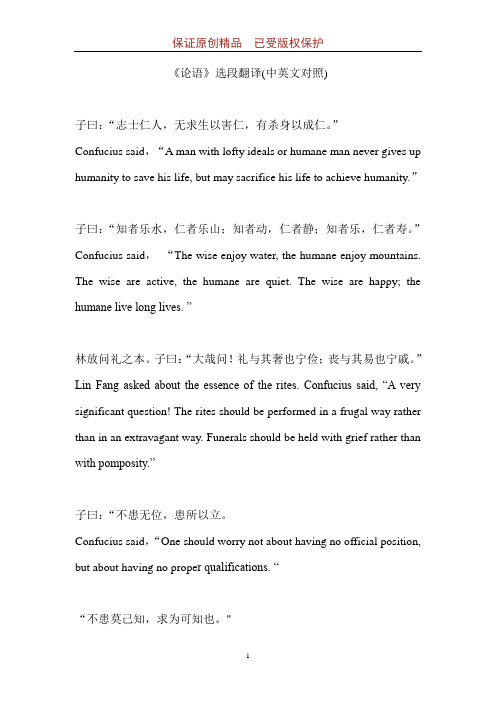
《论语》选段翻译(中英文对照)子曰:“志士仁人,无求生以害仁,有杀身以成仁。
”Confucius said,“A man with lofty ideals or humane man never gives up humanity to save his life, but may sacrifice his life to achieve humanity.”子曰:“知者乐水,仁者乐山;知者动,仁者静;知者乐,仁者寿。
”Confucius said,“The wise enjoy water, the humane enjoy mountains. The wise are active, the humane are quiet. The wise are happy; the humane live long lives. ”林放问礼之本。
子曰:“大哉问!礼与其奢也宁俭;丧与其易也宁戚。
”Lin Fang asked about the essence of the rites. Confucius said, “A very significant question! The rites should be performed in a frugal way rather than in an extravagant way. Funerals should be held with grief rather than with pomposity.”子曰:“不患无位,患所以立。
Confucius said,“One should worry not about having no official position, but about having no prope r qualifications. ““不患莫己知,求为可知也。
"”One should not seek to be known to others, but seek to acquire the qualities worthy of being known.”子曰:“人无远虑,必有近忧。
《论语》英语
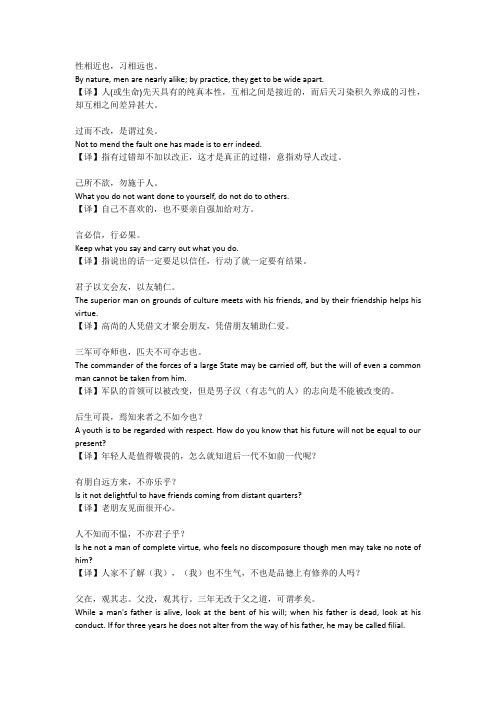
性相近也,习相远也。
By nature, men are nearly alike; by practice, they get to be wide apart.【译】人(或生命)先天具有的纯真本性,互相之间是接近的,而后天习染积久养成的习性,却互相之间差异甚大。
过而不改,是谓过矣。
Not to mend the fault one has made is to err indeed.【译】指有过错却不加以改正,这才是真正的过错,意指劝导人改过。
己所不欲,勿施于人。
What you do not want done to yourself, do not do to others.【译】自己不喜欢的,也不要亲自强加给对方。
言必信,行必果。
Keep what you say and carry out what you do.【译】指说出的话一定要足以信任,行动了就一定要有结果。
君子以文会友,以友辅仁。
The superior man on grounds of culture meets with his friends, and by their friendship helps his virtue.【译】高尚的人凭借文才聚会朋友,凭借朋友辅助仁爱。
三军可夺师也,匹夫不可夺志也。
The commander of the forces of a large State may be carried off, but the will of even a common man cannot be taken from him.【译】军队的首领可以被改变,但是男子汉(有志气的人)的志向是不能被改变的。
后生可畏,焉知来者之不如今也?A youth is to be regarded with respect. How do you know that his future will not be equal to our present?【译】年轻人是值得敬畏的,怎么就知道后一代不如前一代呢?有朋自远方来,不亦乐乎?Is it not delightful to have friends coming from distant quarters?【译】老朋友见面很开心。
论语中英文对照[1]
![论语中英文对照[1]](https://img.taocdn.com/s3/m/59289e7c9b6648d7c0c74614.png)
CONFUCIAN ANALECTS论语中英文对照[1]译者James Legge學而第一BOOK I. HSIO R.【第一章】【一節】子曰、學而時習之、不亦說乎。
【二節】有朋自遠方來、不亦樂乎。
【三節】人不知而不慍、不亦君子乎。
CHAPTER I. 1. The Master said, ''Is it not pleasant to learn with a constant perseverance and application?2. ''Is it not delightful to have friends coming from distant quarters?''3. ''Is he not a man of complete virtue, who feels no discomposure though men may take no note of him?''[ˌdɪskəm'pəʊʒə(r)] 心乱不安【第二章】【一節】有子曰、其為人也孝弟、而好犯上者鮮矣、不好犯上、而好作亂者、未之有也。
【二節】君子務本、本立、而道生、孝弟也者、其為仁之本與。
CHAP. II. 1. The philosopher Yu said, ''They are few who, being filial and fraternal, are fond of offending against their superiors. There have been none, who, not liking to offend against their superiors, have been fond of stirring up confusion.2. ''The superior man bends his attention to what is radical. That being established, all practical courses naturally grow up. Filial piety and fraternal submission!-- are they not the root of all benevolent actions?''【第三章】子曰、巧言令色、鮮矣仁。
《论语》选段翻译(中英文对照)
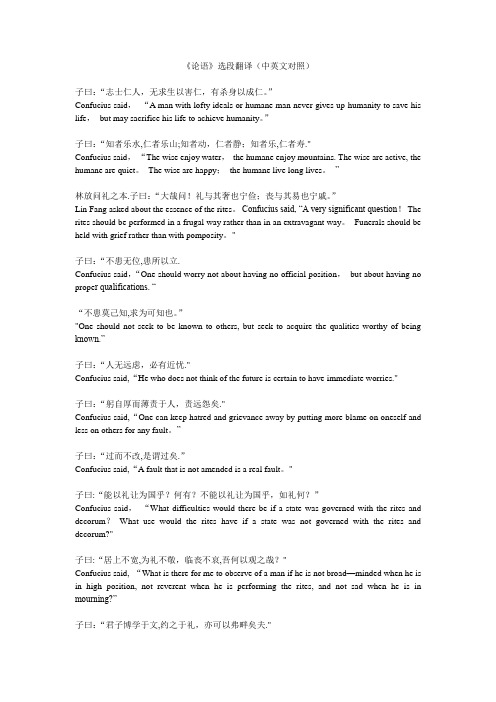
《论语》选段翻译(中英文对照)子曰:“志士仁人,无求生以害仁,有杀身以成仁。
”Confucius said,“A man with lofty ideals or humane man never gives up humanity to save his life,but may sacrifice his life to achieve humanity。
”子曰:“知者乐水,仁者乐山;知者动,仁者静;知者乐,仁者寿."Confucius said,“The wise enjoy water,the humane enjoy mountains. The wise are active, the humane are quiet。
The wise are happy;the humane live long lives。
”林放问礼之本.子曰:“大哉问!礼与其奢也宁俭;丧与其易也宁戚。
”Lin Fang asked about the essence of the rites。
Confucius said, “A very significant question!The rites should be performed in a frugal way rather than in an extravagant way。
Funerals should be held with grief rather than with pomposity。
"子曰:“不患无位,患所以立.Confucius said,“One should worry not about having no official position,but about having no prope r qualifications. ““不患莫己知,求为可知也。
”"One should not seek to be known to others, but seek to acquire the qualities worthy of being known.”子曰:“人无远虑,必有近忧."Confucius said,“He who does not think of the future is certain to have immediate worries."子曰:“躬自厚而薄责于人,责远怨矣."Confucius said,“One can keep hatred and grievance away by putting more blame on oneself and less on others for any fault。
《论语》选段翻译(中英文对照)

《论语》选段翻译(中英文对照)子曰:“志士仁人,无求生以害仁,有杀身以成仁。
”Confucius said, “A man with lofty ideals or humane man never gives up humanity to save his life,but may sacrifice his life to achieve humanity.”子曰:“知者乐水,仁者乐山;知者动,仁者静;知者乐,仁者寿。
”Confucius said, “The wise enjoy water,the humane enjoy mountains. The wise are active, the humane are quiet。
The wise are happy; the humane live long lives. ”林放问礼之本。
子曰:“大哉问!礼与其奢也宁俭;丧与其易也宁戚。
”Lin Fang asked about the essence of the rites. Confucius said, “A very significant question! The rites should be performed in a frugal way rather than in an extravagant way. Funerals should be held with grief rather than with pomposity.”子曰:“不患无位,患所以立。
Confucius said,“One should worry not about having no official position,but about having no proper qualifications。
““不患莫己知,求为可知也。
""One should not seek to be known to others, but seek to acquire the qualities worthy of being known."子曰:“人无远虑,必有近忧.”Confucius said,“He who does not think of the future is certain to have immediate worries."子曰:“躬自厚而薄责于人,责远怨矣。
《论语》全文中英对照

《论语》全文学而第一子曰:“学而时习之,不亦悦乎?有朋自远方来,不亦乐乎?人不知而不愠,不亦君子乎?”The Master "Is it not pleasant to learn with a constant perseveranceand application?"Is it not delightful to have friends coming from distant quarters?"Is he not a man of complete virtue, who feels no discomposure though men may take no note of him?"有子曰:“其为人也孝悌而好犯上者,鲜矣。
不好犯上而好作乱者,未之有也。
君子务本,本立而道生。
孝悌也者,其为仁之本与?”The philosopher Yu said, "They are few who, being filial and fraternal, are fond of offending against their superiors. There havebeen none, who, not liking to offend against their superiors, havebeen fond of stirring up confusion."The superior man bends his attention to what is radical. That being established, all practical courses naturally grow up. Filial piety and fraternal submission,-are they not the root of all benevolent actions?"子曰:“巧言令色,鲜矣仁。
《论语》选段翻译(中英文对照)

《论语》选段翻译(中英文对照)子曰:“志士仁人,无求生以害仁,有杀身以成仁。
”Confucius said, “A man with lofty ideals or humane man never gives up humanity to save his life,but may sacrifice his life to achieve humanity.”子曰:“知者乐水,仁者乐山;知者动,仁者静;知者乐,仁者寿。
”Confucius said, “The wise enjoy water,the humane enjoy mountains. The wise are active, the humane are quiet。
The wise are happy; the humane live long lives. ”林放问礼之本。
子曰:“大哉问!礼与其奢也宁俭;丧与其易也宁戚。
”Lin Fang asked about the essence of the rites. Confucius said, “A very significant question! The rites should be performed in a frugal way rather than in an extravagant way. Funerals should be held with grief rather than with pomposity.”子曰:“不患无位,患所以立。
Confucius said,“One should worry not about having no official position,but about having no proper qualifications。
““不患莫己知,求为可知也。
""One should not seek to be known to others, but seek to acquire the qualities worthy of being known."子曰:“人无远虑,必有近忧.”Confucius said,“He who does not think of the future is certain to have immediate worries."子曰:“躬自厚而薄责于人,责远怨矣。
(完整word版)《论语》选段翻译(中英文对照)

(完整word版)《论语》选段翻译(中英文对照)《论语》选段翻译(中英文对照)子曰:“志士仁人,无求生以害仁,有杀身以成仁。
”Confucius said,“A man with lofty ideals or humane man never gives up humanity to save his life, but may sacrifice his life to achieve humanity.”子曰:“知者乐水,仁者乐山;知者动,仁者静;知者乐,仁者寿。
”Confucius said,“The wise enjoy water, the humane enjoy mountains. The wise are active, the humane are quiet. The wise are happy; the humane live long lives. ”林放问礼之本。
子曰:“大哉问!礼与其奢也宁俭;丧与其易也宁戚。
”Lin Fang asked about the essence of the rites. Confucius said, “A very significant question! The rites should be performed in a frugal way rather than in an extravagant way. Funerals should be held with grief rather than with pomposity.”子曰:“不患无位,患所以立。
Confucius said,“One should worry not about having no official position, but about having no prope r qualifications. ““不患莫己知,求为可知也。
"”One should not seek to be known to others, but seek to acquire the qualities worthy of being known.”子曰:“人无远虑,必有近忧。
《论语》选段翻译(中英文对照)

《论语》选段翻译(中英文对照)子曰:“志士仁人,无求生以害仁,有杀身以成仁。
”Confucius said,“A man with lofty ideals or humane man never gives up humanity to save his life,but may sacrifice his life to achieve humanity。
”子曰:“知者乐水,仁者乐山;知者动,仁者静;知者乐,仁者寿."Confucius said,“The wise enjoy water,the humane enjoy mountains. The wise are active, the humane are quiet。
The wise are happy;the humane live long lives。
”林放问礼之本.子曰:“大哉问!礼与其奢也宁俭;丧与其易也宁戚。
”Lin Fang asked about the essence of the rites。
Confucius said, “A very significant question!The rites should be performed in a frugal way rather than in an extravagant way。
Funerals should be held with grief rather than with pomposity。
"子曰:“不患无位,患所以立.Confucius said,“One should worry not about having no official position,but about having no prope r qualifications. ““不患莫己知,求为可知也。
”"One should not seek to be known to others, but seek to acquire the qualities worthy of being known.”子曰:“人无远虑,必有近忧."Confucius said,“He who does not think of the future is certain to have immediate worries."子曰:“躬自厚而薄责于人,责远怨矣."Confucius said,“One can keep hatred and grievance away by putting more blame on oneself and less on others for any fault。
中英文对照版《论语》
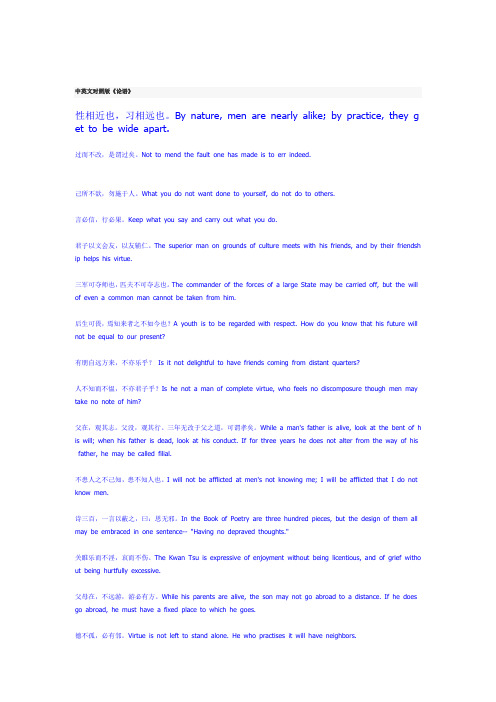
中英文对照版《论语》性相近也,习相远也。
By nature, men are nearly alike; by practice, they g et to be wide apart.过而不改,是谓过矣。
Not to mend the fault one has made is to err indeed.己所不欲,勿施于人。
What you do not want done to yourself, do not do to others.言必信,行必果。
Keep what you say and carry out what you do.君子以文会友,以友辅仁。
The superior man on grounds of culture meets with his friends, and by their friendsh ip helps his virtue.三军可夺师也,匹夫不可夺志也。
The commander of the forces of a large State may be carried off, but the will of even a common man cannot be taken from him.后生可畏,焉知来者之不如今也?A youth is to be regarded with respect. How do you know that his future will not be equal to our present?有朋自远方来,不亦乐乎?Is it not delightful to have friends coming from distant quarters?人不知而不愠,不亦君子乎?Is he not a man of complete virtue, who feels no discomposure though men may take no note of him?父在,观其志。
《论语》英文版
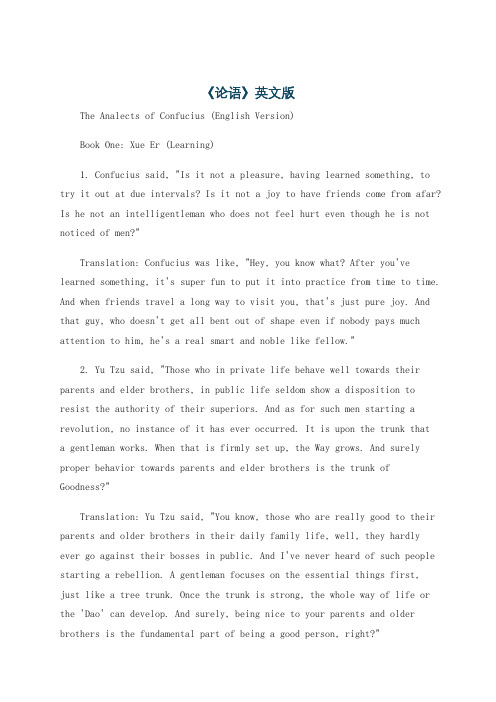
《论语》英文版The Analects of Confucius (English Version)Book One: Xue Er (Learning)1. Confucius said, "Is it not a pleasure, having learned something, to try it out at due intervals? Is it not a joy to have friends come from afar? Is he not an intelligentleman who does not feel hurt even though he is not noticed of men?"Translation: Confucius was like, "Hey, you know what? After you've learned something, it's super fun to put it into practice from time to time. And when friends travel a long way to visit you, that's just pure joy. And that guy, who doesn't get all bent out of shape even if nobody pays much attention to him, he's a real smart and noble like fellow."2. Yu Tzu said, "Those who in private life behave well towards their parents and elder brothers, in public life seldom show a disposition to resist the authority of their superiors. And as for such men starting a revolution, no instance of it has ever occurred. It is upon the trunk thata gentleman works. When that is firmly set up, the Way grows. And surely proper behavior towards parents and elder brothers is the trunk of Goodness?"Translation: Yu Tzu said, "You know, those who are really good to their parents and older brothers in their daily family life, well, they hardly ever go against their bosses in public. And I've never heard of such people starting a rebellion. A gentleman focuses on the essential things first,just like a tree trunk. Once the trunk is strong, the whole way of life or the 'Dao' can develop. And surely, being nice to your parents and older brothers is the fundamental part of being a good person, right?"Book Two: Wei Zheng (The Practice of Government)1. Confucius said, "Guide them by edicts, keep them in line with punishments, and the common people will stay out of trouble but will have no sense of shame. Guide them by virtue, keep them in line with the rites, and they will, besides having a sense of shame, reform themselves."Translation: Confucius said, "If you just boss people around with laws and scare them with punishments, the ordinary folks will avoid getting into trouble, but they won't really feel ashamed of doing wrong. But if you lead them with good morals and make them follow proper etiquettes, not only will they feel ashamed when they do wrong, but they'll also correct themselves."2. Ji Kangzi asked Confucius about government, saying, "What would you think if, in order to move closer to those who possess the Way, I were to kill those who do not follow the Way?" Confucius replied, "In administering your government, what need is there for you to kill? Just desire the good yourself and the common people will be good. The moral character of the ruler is like wind and that of the common people is like grass. In whatever direction the wind blows, the grass always bends."Translation: Ji Kangzi asked Confucius about how to run a government. He said, "Hey, Confucius, what if I killed those who don't follow the right path so that I can get closer to those who are on the right track?" Confucius was like, "Dude, when you're running the government, why do you need to kill? If you just want good things yourself, the common people will be good too. The ruler's moral quality is like the wind, and the common people are like grass. No matter which way the wind blows, the grass will always bend in that direction."。
论语的经典英文翻译

1.温故而知新,可以为师矣。
If a man keeps cherishing his old knowledge, so as continually to be acquiringnew, he may be a teacher of others.2.学而不思则罔,思而不学则殆。
Learning without thought is labour lost; thought without learning isperilous. 3.敏而好学,不耻下问。
He was of an active nature and yet fond of learning, and he was not ashamed to askand learn of his inferiors.4.知之者,不如好之者,好之者,不如乐之者。
They who know the truth are not equal to those who loveit, and they who love it are not equal to those who delight in it.5.默而识之,学而不厌,诲人不倦,何有于我哉。
The silent treasuring up of knowledge; learning withoutsatiety; and instructing others without being wearied -- which one of these things belongs to me? 6.三人行,必有我师焉。
择其善者而从之,其不善者而改之。
When I walk along with two others, theymay serve me as my teachers. I will select their good qualities and follow them, their bad qualities and avoidthem. 7.子曰:“知之者不如好之者,好之者不如乐之者。
论语十则英文翻译
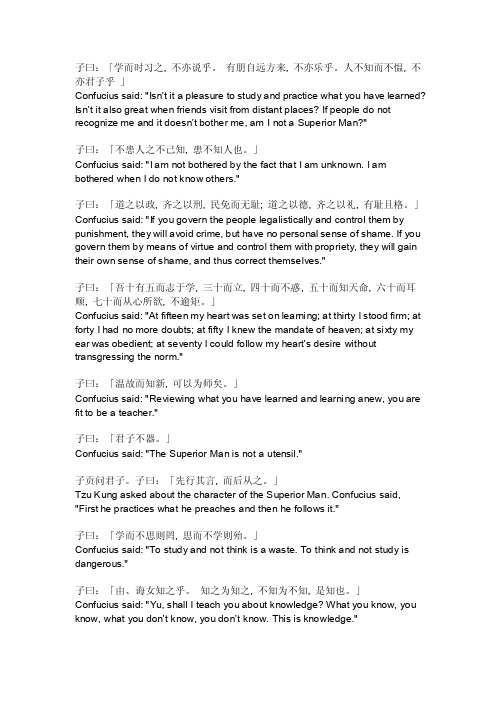
子曰:「学而时习之, 不亦说乎。
有朋自远方来, 不亦乐乎。
人不知而不愠, 不亦君子乎」Confucius said: "Isn’t it a pleasure to study and practice what you have learned? Isn’t it also great when friends visit from distant places? If people do not recognize me and it doesn’t bother me, am I not a Superior Man?"子曰:「不患人之不己知, 患不知人也。
」Confucius said: "I am not bothered by the fact that I am unknown. I am bothered when I do not know others."子曰:「道之以政, 齐之以刑, 民免而无耻; 道之以德, 齐之以礼, 有耻且格。
」Confucius said: "If you govern the people legalistically and control them by punishment, they will avoid crime, but have no personal sense of shame. If you govern them by means of virtue and control them with propriety, they will gain their own sense of shame, and thus correct themselves."子曰:「吾十有五而志于学, 三十而立, 四十而不惑, 五十而知天命, 六十而耳顺, 七十而从心所欲, 不逾矩。
」Confucius said: "At fifteen my heart was set on learning; at thirty I stood firm; at forty I had no more doubts; at fifty I knew the mandate of heaven; at sixty my ear was obedient; at seventy I could follow my heart’s desire without transgressing the norm."子曰:「温故而知新, 可以为师矣。
- 1、下载文档前请自行甄别文档内容的完整性,平台不提供额外的编辑、内容补充、找答案等附加服务。
- 2、"仅部分预览"的文档,不可在线预览部分如存在完整性等问题,可反馈申请退款(可完整预览的文档不适用该条件!)。
- 3、如文档侵犯您的权益,请联系客服反馈,我们会尽快为您处理(人工客服工作时间:9:00-18:30)。
高一语文《论语》引文翻译1、“《论语》者,孔子应答弟子、时人及弟子相与言而接闻于夫子之语也。
当时弟子各有所记。
夫子既卒,门人相与辑而论纂,故谓之《论语》。
”【译文】《论语》这部书是记录孔子回答他的弟子,社会上的一些人以及弟子向孔子请教的言论片断。
孔子死后,他的门人弟子相继搜集整理而编成,所以叫作《论语》.2、【原文】太宰问于子贡曰:“夫子圣者与?何其多能也?”子贡曰:“固天纵之将圣,又多能也。
”子闻之,曰:“太宰知我乎?吾少也贱,故多能鄙事。
君子多乎哉,不多也。
”【译文】太宰问子贡:“老师是圣人吗?为什么如此多才多艺?”子贡说:“老天本来就要他成为圣人,又要他多才多艺。
”孔子听说后,说:“太宰了解我吗?我小时候生活艰难,所以会干一些粗活。
贵族会有这么多技艺吗?不会有的。
”(我小时候生活穷苦,所以学会了许多鄙贱的技艺。
)3、子曰:"三人行,必有我师焉。
择其善者而从之,其不善者而改之。
【译文】孔子说:"三人走路,必有人可作为我的老师。
选择他的优点向他学习,借鉴他的缺点进行自我改正。
"(几个人一起走路,其中便一定有值得我学习的人。
我选取那些优点而效法,把好的言行记在心里;对于他们身上的缺点,我进行反省,如果自己身上也有,就立即改去。
)4、君君,臣臣,父父,子子。
译文:君尽君道,臣尽臣道,父尽父道,子尽子道。
5、子曰:“巧言令色,鲜矣仁!”孔子说:“花言巧语,装出和颜悦色的样子,这种人的仁心就很少了。
”(孔子说:“花言巧语,装出一副伪善的面孔,这种人很少有仁德的。
”)6、子曰:“知者乐水,仁者乐山。
知者动,仁者静。
知者乐,仁者寿。
”孔子说:“聪明人喜爱水,有仁德者喜爱山;聪明人活动,仁德者沉静。
聪明人快乐,有仁德者长寿。
” (孔子说:“聪明的人喜好水,仁慈的人喜好山。
聪明的人生动活泼,仁慈的人沉厚宁静。
聪明的人生活快乐,仁厚的人有涵养,寿命长。
”)7、子贡问曰:“有一言而可以终身行之者乎?”子曰:“其恕乎!己所不欲,勿施于人。
” 【译文】子贡问孔子问道:“有没有一个字可以终身奉行的呢?”孔子回答说:“那就是恕吧!自己不愿意的,不要强加给别人。
”(子贡问孔子说:“有一句话可以作为终身奉行的准则吗?”孔子回答:“那就是‘恕’吧!自己不愿做的,不要强加给别人。
” )8、子张问政。
子曰:“居之无倦,行之以忠。
”(子张问如何治理政事。
孔子说:“做官要始终如一,不肯懈怠,执行政令表里如一,忠心不二。
”)【译文】子张问如何治理政事。
孔子说:“居于官位不懈怠,执行君令要忠实。
”9、颜渊、季路侍。
子曰:“盍各言尔志?”子路曰:“愿车马衣轻裘,与朋友共,敝之而无憾。
”颜渊曰:“愿无伐善,无施劳。
”子路曰:“愿闻子之志。
”子曰:“老者安之,朋友信之,少者怀之。
”【译文】颜渊、子路两人侍立在孔子身边。
孔子说:“你们何不各自说说自己的志向?”子路说:“愿意拿出自己的车马、衣服、皮袍,同我的朋友共同使用,用坏了也不抱怨。
”颜渊说:“我愿意不夸耀自己的长处,不表白自己的功劳。
”子路向孔子说:“愿意听听您的志向。
”孔子说:“(我的志向是)让年老的安心,让朋友们信任我,让年轻的子弟们得到关怀。
”颜渊、季路侍从。
孔子说:“何不各人说说自己的志向?”子路说:“愿将车马及皮袍衣服与朋友共享,用坏了也不引为遗憾。
”颜渊说:“希望不夸耀自己的长处,不表白劳绩。
”子路说:“希望听到老师的志向。
”孔子说:“使老人安逸,使朋友信任,使年轻人得到关怀。
”10、非礼勿视,非礼勿听,非礼勿言,非礼勿动。
不符合礼的事不去看,不符合礼的话不去听,不符合礼的话不去说,不符合礼的事不去做。
11、克己复礼为仁译文:克制自己的私欲,使言行合于礼,这就是仁。
12、为仁由己,而由乎人哉? 译:修养仁德全靠自己,难道是靠别人吗?13、仁远乎哉?我欲仁,斯仁至矣。
译:仁德难道离我们很远吗?我想要达到仁,仁就来了。
14、“己所不欲,勿施于人”译:自己不想要的东西,切勿强加给别人。
15、己欲立而立人,己欲达而达人。
自己想要立身,从而使别人立身,自己想要通达从而使别人通达。
16、子曰:“为政以德,譬如北辰①,居其所而众星共之②。
”【注释】①北辰:北极星。
距地球约782光年。
由于太远,从地球上看它似乎不动,实际仍在高速运转。
②共:同“拱”。
环绕。
【译文】孔子说:“管理国家要以身做则。
如同北极星,安然不动而众星绕之。
【今译】孔子说:“[君]治理国家,用道德教化来推行政治,就像北极星一样,处于它一定的方位上,而群星都环绕在它的周围。
”17、子曰:“道之以政①,齐之以刑②,民免而无耻③;道之以德,齐之以礼,有耻且格④。
” 【注释】①道:同“导”。
治理,引导。
②齐:整治,约束,统一。
③免:避免,指避免犯错误。
无耻:做了坏事,心里不知羞耻;没有(或缺乏)羞耻之心。
④格:正,纠正。
【今译】孔子说:“用行政命令来治理,用刑法来处罚,人民虽然能避免犯罪,但还不是从心里知道[犯罪]是可耻的;用道德教化来治理,用礼来约束,人民就会有羞耻之心,而且会[自觉地]改过。
”18、其身正,不令而行;其身不正,虽令不从。
有职位的人本身正直,这样不发命令事情也能办得好 ;有职位的人本身不正直 ,即使强发命令下属也不会听从。
19、子贡曰:“如有博施于民而能济众,何如?可谓仁乎?” 子曰:“何事于仁,必也圣乎!尧舜其犹病诸!夫仁者,己欲立而立人,己欲达而达人。
能近取譬,可谓仁之方也已。
”子贡说:“假若有一个人,他能给老百姓很多好处又能周济大众,怎么样?可以算是仁人了吗?” 孔子说:“岂止是仁人,简直是圣人了!就连尧、舜尚且难以做到呢。
至于仁人,就是要想自己站得住,也要帮助人家一同站得住;要想自己过得好,也要帮助人家一同过得好。
凡事能就近以自己作比,而推己及人,可以说就是实行仁的方法了。
”20、有教无类。
类:类别。
不管什么人都可以受到教育。
(教育人不要区分若干等类。
)21、学而不厌,诲人不倦。
译文:努力学习,坚持不懈,教导别人从来不知道疲倦。
22、子曰:“由①,诲女②,知之乎?知之为知之,不知为不知,是知也③。
”【注释】① 由:姓仲,名由,字子路,又字季路。
鲁国卞(今山东省平邑县东北)人。
是孔子早年的弟子。
长期跟随孔子,是忠实的警卫。
曾做季康子的家臣,后死于卫国内乱。
生于公元前542年,卒于公元前48 0年,比孔子小九岁。
② 诲(huì会):教导,教育,诱导。
女:同“汝”。
你。
③ 知:前五个“知”字,是知道,了解,懂得。
最后“是知也”的“知”,同“智”。
明智,聪明,真知。
之:代词。
指孔子所讲授的知识、学问。
(知道的就是知道的,不知道的就是不知道的,这就关于知道的真谛。
)【今译】孔子说:“仲由,我教导你的[知识],知道了吗?知道就是知道,不知道就是不知道,这种态度才是明智的。
”23、“敏而好学,不耻下问”聪敏又好学,不以向职位比自己低、学问比自己差的人求学为耻辱。
24、子曰:“温故而知新①,可以为师矣。
”【注释】① 故:旧的,原先的。
【译文】孔子说:"温习旧知识时,能有新收获,就可以做老师了。
"【今译】孔子说:“时时温习已经学过的知识,由此就能获取新的更深的知识,这样就可以为人师表了。
25、子曰:“学而不思则罔①,思而不学则殆②。
”【注释】①思:思考,思维。
罔(wǎng网):同“惘”。
迷惑,昏而无得。
一说,欺罔,蒙蔽,受骗。
另说,“罔”,即无,无所得。
②殆(dài代):危险。
一说,没有信心。
【今译】孔子说:“学习了而不深入思考,就会迷惑;[但]只是去空想而不去学习,那就危险了。
”【译文】孔子说:"读书不想事,越学越糊涂;想事不读书,越想越头痛。
26、子曰:“不愤不启、不悱不发,举一隅不以三隅反,则不复也。
”【译文】孔子说:“不到苦思冥想时,不去提醒;不到欲说无语时,不去引导。
不能举一例能理解三个类似的问题,就不要再教他了。
翻译: 不到他努力想弄明白而不得的程度不要去开导他;不到他心里明白却不能完善表达出来的程度不要去启发他。
如果他不能举一反三,就不要再反复地给他举例.27、孔子曰:“益者三友,损者三友。
友直、友谅、有多闻,益矣;友便辟、友善柔、友便佞,损矣。
” 【译文】孔子说:“有益的朋友有三种,有害的朋友有三种。
与正直的人交朋友、与诚实的人交朋友、与见多识广的人交朋友,有益处;与走邪门歪道的人交朋友、与谗媚奉迎的人交朋友、与花言巧语的人交朋友,有害处。
28、孔子曰:“君子有三戒:少之时,血气未定,戒之在色;及其壮也,血气方刚,戒之在斗;及其老也,血气既衰,戒之在得。
”【译文】孔子说:“君子有三件事要警戒:年轻时,血气还不成熟,要戒女色;年壮时,血气正旺盛,要戒争斗;年老时,血气已衰落,要戒贪婪。
”君子有三种禁戒:少年的时候,血气还没有稳定,力戒贪恋女色;到了壮年时期,血气正当旺盛,力戒逞强好斗;到了老年时期,血气已经衰弱,力戒贪得无厌。
29、子曰:“人而无信①,不知其可也。
【注释】① 信:讲信用,说了算数。
【今译】孔子说:“人不讲信用,真不知道怎么可以呢!30、见贤思齐焉,见不贤而内自省也。
看见贤德的人想向他看齐,看见不贤的人而内心自我省察。
【译文】孔子说:"见到贤人,要向他看齐;见到不贤,要反省自己。
"31、君子坦荡荡,小人长戚戚。
(君子心地平坦宽广,小人经常局促忧愁。
)【译文】孔子说:"君子总是胸怀宽广,小人总是忧愁悲伤。
"32、三军可夺帅也,匹夫不可夺志也。
【译文】孔子说:"三军可以剥夺主帅,匹夫不可剥夺志向。
"一个国家的军队,可以使他丧失主帅;一个小小的男子汉,却不能强迫他改变自己的志向。
33、【原文】子曰:"岁寒,然后知松柏之后凋也。
"【译文】孔子说:"天冷时,才知道松柏最后凋谢。
"天冷以后,才知道松柏树的叶子是最后凋落的。
34、君子病无能焉,不病人之不己知也。
君子只应担心自己没有才能,不必担心别人不了解自己。
35、【原文】子贡问为仁,子曰:"工欲善其事,必先利其器。
居是邦也,事其大夫之贤者,友其士之仁者。
"(工匠要想做好他的工作,首先一定要把工具磨锋利。
)【译文】子贡问怎样实现仁,孔子说:"工人要做好工,必先磨好工具。
生活在那里,就要追随那里的品德高尚的领导,结交那里的仁义之士。
"36、朽木不可雕也。
译文:腐朽的木头不可能雕刻。
37、【原文】叶公问孔子于子路,子路不对。
子曰:"汝奚不曰:其为人也,发愤忘食,乐以忘忧,不知老之将至云尔?"【译文】叶公问子路:孔子是怎样的人,子路不回答。
孔子说:"你怎么不说:他这个人啊,发愤学习就忘记吃饭,高兴起来就忘记了忧愁,不知道快要变老了等等?"(发愤用功,忘记吃饭,高兴起来忘记忧愁,不晓得衰老即将到来。
